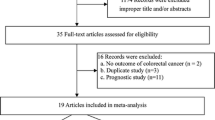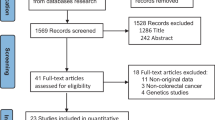Abstract
Purpose
The association between prediagnostic interleukin-6 (IL-6) concentrations and risk of colorectal cancer was evaluated in a nested case–control study and a meta-analysis of prospective studies.
Methods
Colorectal cancer cases (n = 173) and matched controls (n = 345) were identified between 1989 and 2000 among participants in the CLUE II cohort of Washington Country, Maryland. Matched odds ratios and the corresponding 95 % confidence intervals (CIs) were estimated using conditional logistic regression models.
Results
Participants in the highest third of plasma IL-6 concentration had a 2.48 times higher risk of colon cancer compared to participants in the bottom third (95 % CI 1.26–4.87; p-trend 0.02) after multivariate adjustment. This association did not differ according to the stage of disease, age, sex, or other potential modifying variables and remained statistically significant after adjustment for C-reactive protein concentrations. No statistically significant association was observed for rectal cancer risk. The meta-analysis of six prospective studies yielded an increased but borderline statistically significant risk of colon cancer per 1 U increase in naturally logarithm-transformed IL-6 (summary RR 1.22; 95 % CI 1.00–1.49; I 2 46 %). An inverse association was noted for rectal cancer (RR 0.69; 95 % CI 0.54–0.88; I 2 0 %), but there was evidence for small-study effects (p 0.02).
Conclusion
Our findings provide support for a modest positive association between IL-6 concentrations and colon cancer risk. More work is needed to determine whether IL-6 is a valid marker of colorectal inflammation and whether such inflammation contributes to colon and rectal cancer risk.


Similar content being viewed by others
References
Hunter CA, Jones SA (2015) IL-6 as a keystone cytokine in health and disease. Nat Immunol 16:448–457
Naka T, Nishimoto N, Kishimoto T (2002) The paradigm of IL-6: from basic science to medicine. Arthritis Res 4(Suppl 3):S233–S242
Becker C, Fantini MC, Wirtz S et al (2005) IL-6 signaling promotes tumor growth in colorectal cancer. Cell Cycle 4:217–220
Heikkila K, Harris R, Lowe G et al (2009) Associations of circulating C-reactive protein and interleukin-6 with cancer risk: findings from two prospective cohorts and a meta-analysis. Cancer Causes Control 20:15–26
Song M, Wu K, Ogino S, Fuchs CS, Giovannucci EL, Chan AT (2013) A prospective study of plasma inflammatory markers and risk of colorectal cancer in men. Br J Cancer 108:1891–1898
Il’yasova D, Colbert LH, Harris TB et al (2005) Circulating levels of inflammatory markers and cancer risk in the health aging and body composition cohort. Cancer Epidemiol Biomarkers Prev 14:2413–2418
Ho GY, Wang T, Gunter MJ et al (2012) Adipokines linking obesity with colorectal cancer risk in postmenopausal women. Cancer Res 72:3029–3037
Chan AT, Ogino S, Giovannucci EL, Fuchs CS (2011) Inflammatory markers are associated with risk of colorectal cancer and chemopreventive response to anti-inflammatory drugs. Gastroenterology 140:799–808 (quiz e11)
Erlinger TP, Platz EA, Rifai N, Helzlsouer KJ (2004) C-reactive protein and the risk of incident colorectal cancer. JAMA 291:585–590
Block G, Hartman AM, Dresser CM, Carroll MD, Gannon J, Gardner L (1986) A data-based approach to diet questionnaire design and testing. Am J Epidemiol 124:453–469
Wells GA, Shea B, O’Connell D, et al The Newcastle-Ottawa Scale (NOS) for assessing the quality of nonrandomised studies in meta-analyses. http://www.ohri.ca/programs/clinical_epidemiology/oxford.asp.
Comstock SS, Hortos K, Kovan B, McCaskey S, Pathak DR, Fenton JI (2014) Adipokines and obesity are associated with colorectal polyps in adult males: a cross-sectional study. PLoS One 9:e85939
Sasaki Y, Takeda H, Sato T et al (2012) Serum interleukin-6, insulin, and HOMA-IR in male individuals with colorectal adenoma. Clin Cancer Res 18:392–399
Sterne JA, Sutton AJ, Ioannidis JP et al (2011) Recommendations for examining and interpreting funnel plot asymmetry in meta-analyses of randomised controlled trials. BMJ 343:d4002
Corpet DE, Pierre F (2003) Point: from animal models to prevention of colon cancer. Systematic review of chemoprevention in min mice and choice of the model system. Cancer Epidemiol Biomarkers Prev 12:391–400
Corpet DE, Tache S (2002) Most effective colon cancer chemopreventive agents in rats: a systematic review of aberrant crypt foci and tumor data, ranked by potency. Nutr Cancer 43:1–21
Itzkowitz SH, Yio X (2004) Inflammation and cancer IV. Colorectal cancer in inflammatory bowel disease: the role of inflammation. Am J Physiol Gastrointest Liver Physiol 287:G7–G17
Itzkowitz SH (2002) Cancer prevention in patients with inflammatory bowel disease. Gastroenterol Clin North Am 31:1133–1144
Arber N, Eagle CJ, Spicak J et al (2006) Celecoxib for the prevention of colorectal adenomatous polyps. N Engl J Med 355:885–895
Bertagnolli MM, Eagle CJ, Zauber AG et al (2006) Celecoxib for the prevention of sporadic colorectal adenomas. N Engl J Med 355:873–884
Benamouzig R, Deyra J, Martin A et al (2003) Daily soluble aspirin and prevention of colorectal adenoma recurrence: one-year results of the APACC trial. Gastroenterology 125:328–336
Rosenberg L, Palmer JR, Zauber AG, Warshauer ME, Stolley PD, Shapiro S (1991) A hypothesis: nonsteroidal anti-inflammatory drugs reduce the incidence of large-bowel cancer. J Natl Cancer Inst 83:355–358
Danesh J, Lewington S, Thompson SG et al (2005) Plasma fibrinogen level and the risk of major cardiovascular diseases and nonvascular mortality: an individual participant meta-analysis. JAMA 294:1799–1809
Gunter MJ, Canzian F, Landi S, Chanock SJ, Sinha R, Rothman N (2006) Inflammation-related gene polymorphisms and colorectal adenoma. Cancer Epidemiol Biomarkers Prev 15:1126–1131
Ko WF, Helzlsouer KJ, Comstock GW (1994) Serum albumin, bilirubin, and uric acid and the anatomic site-specific incidence of colon cancer. J Natl Cancer Inst 86:1874–1875
Landi S, Moreno V, Gioia-Patricola L et al (2003) Association of common polymorphisms in inflammatory genes interleukin (IL)6, IL8, tumor necrosis factor alpha, NFKB1, and peroxisome proliferator-activated receptor gamma with colorectal cancer. Cancer Res 63:3560–3566
Lee YJ, Lee HR, Nam CM, Hwang UK, Jee SH (2006) White blood cell count and the risk of colon cancer. Yonsei Med J 47:646–656
Theodoropoulos G, Papaconstantinou I, Felekouras E et al (2006) Relation between common polymorphisms in genes related to inflammatory response and colorectal cancer. World J Gastroenterol 12:5037–5043
Tsilidis KK, Erlinger TP, Rifai N et al (2008) C-reactive protein and colorectal adenoma in the CLUE II cohort. Cancer Causes Control 19:559–567
Tsilidis KK, Branchini C, Guallar E, Helzlsouer KJ, Erlinger TP, Platz EA (2008) C-reactive protein and colorectal cancer risk: a systematic review of prospective studies. Int J Cancer 123:1133–1140
Aleksandrova K, Jenab M, Boeing H et al (2010) Circulating C-reactive protein concentrations and risks of colon and rectal cancer: a nested case–control study within the European Prospective Investigation into Cancer and Nutrition. Am J Epidemiol 172:407–418
Prizment AE, Anderson KE, Visvanathan K, Folsom AR (2011) Association of inflammatory markers with colorectal cancer incidence in the atherosclerosis risk in communities study. Cancer Epidemiol Biomarkers Prev 20:297–307
Allin KH, Bojesen SE, Nordestgaard BG (2009) Baseline C-reactive protein is associated with incident cancer and survival in patients with cancer. J Clin Oncol 27:2217–2224
Zhou B, Shu B, Yang J, Liu J, Xi T, Xing Y (2014) C-reactive protein, interleukin-6 and the risk of colorectal cancer: a meta-analysis. Cancer Causes Control 25:1397–1405
Allin KH, Nordestgaard BG, Zacho J, Tybjaerg-Hansen A, Bojesen SE (2010) C-reactive protein and the risk of cancer: a mendelian randomization study. J Natl Cancer Inst 102:202–206
Heikkila K, Silander K, Salomaa V et al (2011) C-reactive protein-associated genetic variants and cancer risk: findings from FINRISK 1992, FINRISK 1997 and Health 2000 studies. Eur J Cancer 47:404–412
Prizment AE, Folsom AR, Dreyfus J et al (2013) Plasma C-reactive protein, genetic risk score, and risk of common cancers in the Atherosclerosis Risk in Communities study. Cancer Causes Control 24:2077–2087
Nimptsch K, Aleksandrova K, Boeing H, et al (2015) Association of CRP genetic variants with blood concentrations of C-reactive protein and colorectal cancer risk. Int J Cancer 136:1181–1192
Tsilidis KK, Papatheodorou SI, Evangelou E, Ioannidis JP (2012) Evaluation of excess statistical significance in meta-analyses of 98 biomarker associations with cancer risk. J Natl Cancer Inst 104:1867–1878
Pischon T, Hankinson SE, Hotamisligil GS, Rifai N, Rimm EB (2003) Leisure-time physical activity and reduced plasma levels of obesity-related inflammatory markers. Obes Res 11:1055–1064
Acknowledgments
The authors thank Despoina Capothanassi for her statistical programming support, Dr. Thomas P Erlinger for his support of research on inflammation biomarkers and colorectal cancer risk in CLUE, and the authors of the original studies (Drs. Katriina Heikkila, Andrew Chan, Gloria Ho, and Mingyang Song), who kindly and promptly replied to our requests for additional information. Cancer incidence data were provided by the Maryland Cancer Registry, Center for Cancer Prevention and Control, Department of Health and Mental Hygiene, 201 W. Preston Street, Room 400, Baltimore, MD 21201, http://phpa.dhmh.maryland.gov/cancer, 410-767-4055. We acknowledge the State of Maryland, the Maryland Cigarette Restitution Fund, the Washington County Cancer Registry, and the National Program of Cancer Registries of the Centers for Disease Control and Prevention (CDC) for the funds that helped support the availability of the cancer registry data. The findings and conclusions of this report are those of the authors and do not necessarily represent the views of the Department of Health and Mental Hygiene.
Funding
This research was funded by the American Institute for Cancer Research and the Maryland Cigarette Restitution Fund at Johns Hopkins, and the National Cancer Institute (P30 CA006973 to W.G. Nelson).
Author Contributions
JH-B, KJH, and EAP were involved in formulating the hypothesis and the design of the study protocol. The study hypothesis arose before inspection of the data. All authors had full access to all of the data in the study and can take responsibility for the integrity of the data and the accuracy of the data analysis. GB and NR measured the IL-6 concentrations. AK, CK, and KKT carried out the search of the literature, data abstraction, data management, and statistical analysis. DSL verified several inputs of the final database of the meta-analysis. AK, CK, EAP, and KKT wrote the first draft, and all authors contributed to further drafts and approved the final version submitted.
Author information
Authors and Affiliations
Corresponding author
Ethics declarations
Competing interests
All authors have completed the ICMJE uniform disclosure form at www.icmje.org/coi_disclosure.pdf (available on request from the corresponding author) and declare that: [1] No authors have support from any company for the submitted work; [2] no authors have relationships with any company that might have an interest in the submitted work; [3] the authors’ spouses, partners, or children do not have any financial relationships that may be relevant to the submitted work; and [4] all authors have no nonfinancial interests that may be relevant to the submitted work.
Ethical approval
All participants provided informed consent, and the Institutional Review Board at the Johns Hopkins Bloomberg School of Public Health approved the study. The evidence synthesis study did not require an ethics approval.
Electronic supplementary material
Below is the link to the electronic supplementary material.
Rights and permissions
About this article
Cite this article
Kakourou, A., Koutsioumpa, C., Lopez, D.S. et al. Interleukin-6 and risk of colorectal cancer: results from the CLUE II cohort and a meta-analysis of prospective studies. Cancer Causes Control 26, 1449–1460 (2015). https://doi.org/10.1007/s10552-015-0641-1
Received:
Accepted:
Published:
Issue Date:
DOI: https://doi.org/10.1007/s10552-015-0641-1




